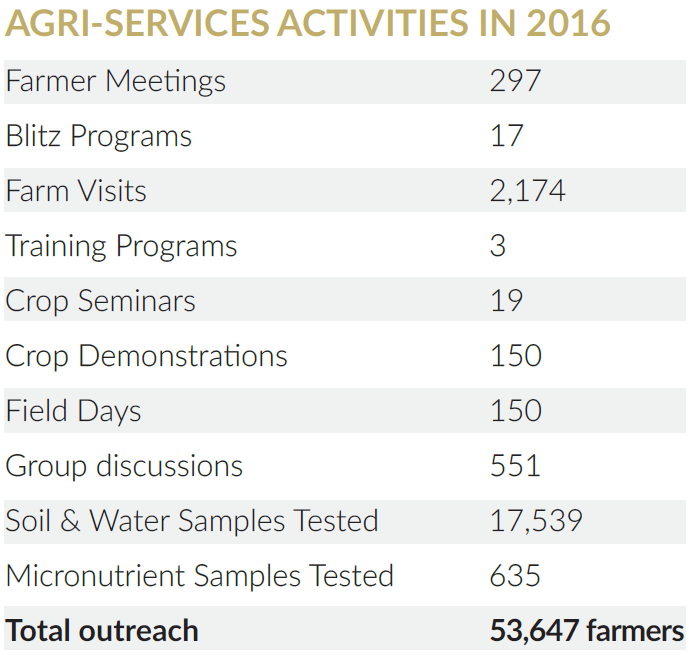

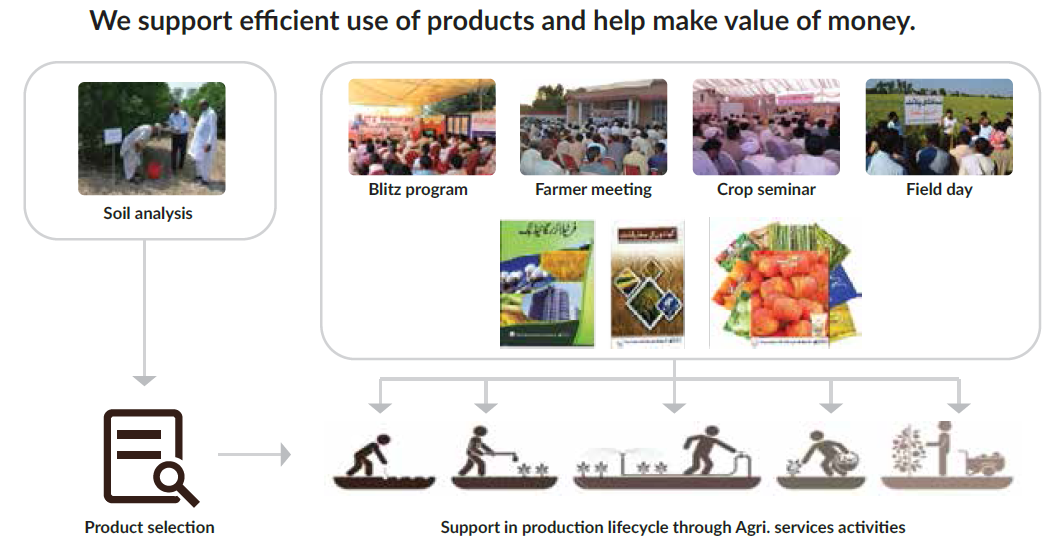
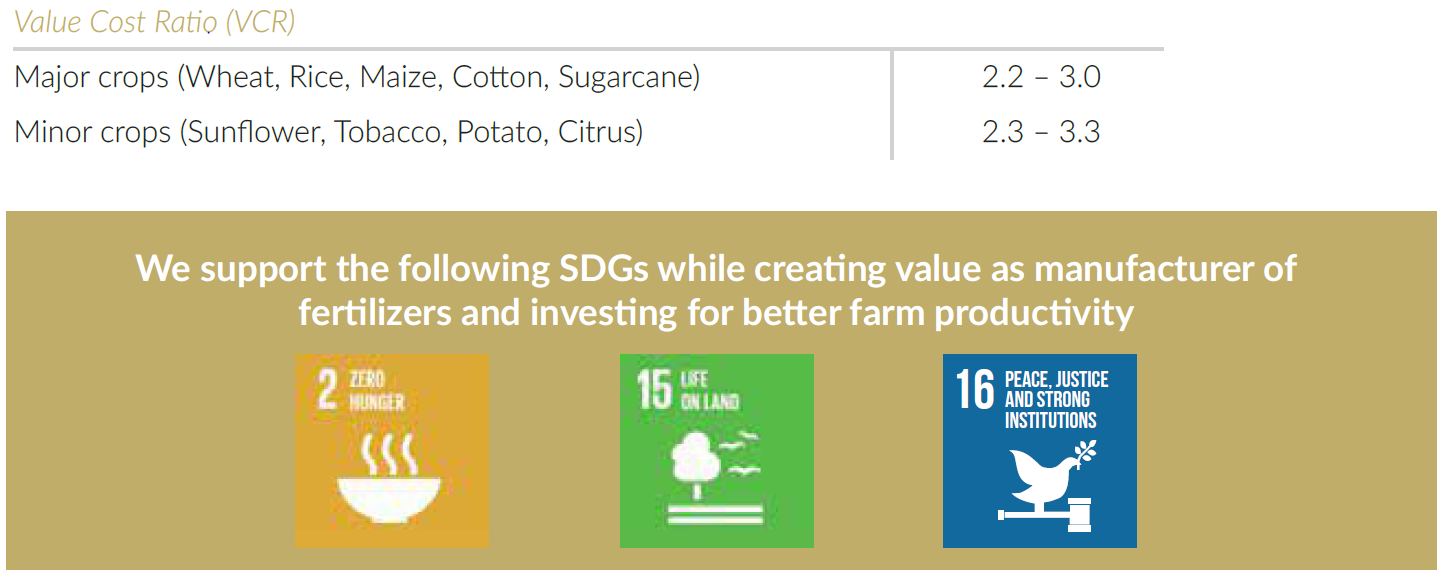
Permanent Fulltime Employees
Male : 3,329
Female : 86
Permanent Contractual Employees
Male : 3,094
Female : 76
Temporary Contract Employees
Male : 235
Female : 10
Employees by employment type broken by gender
Head Office-RWP
Permanent : 813
Temporary : 45
Goth Machhi Plant
Permanent : 949
Temporary : 129
Mirpur Mathelo Plant
Permanent : 713
Temporary : 51
Lahore
Permanent : 623
Temporary : 14
Karachi
Permanent : 72
Temporary : 6
Total Employees
Permanent :3,170
Temporary : 245
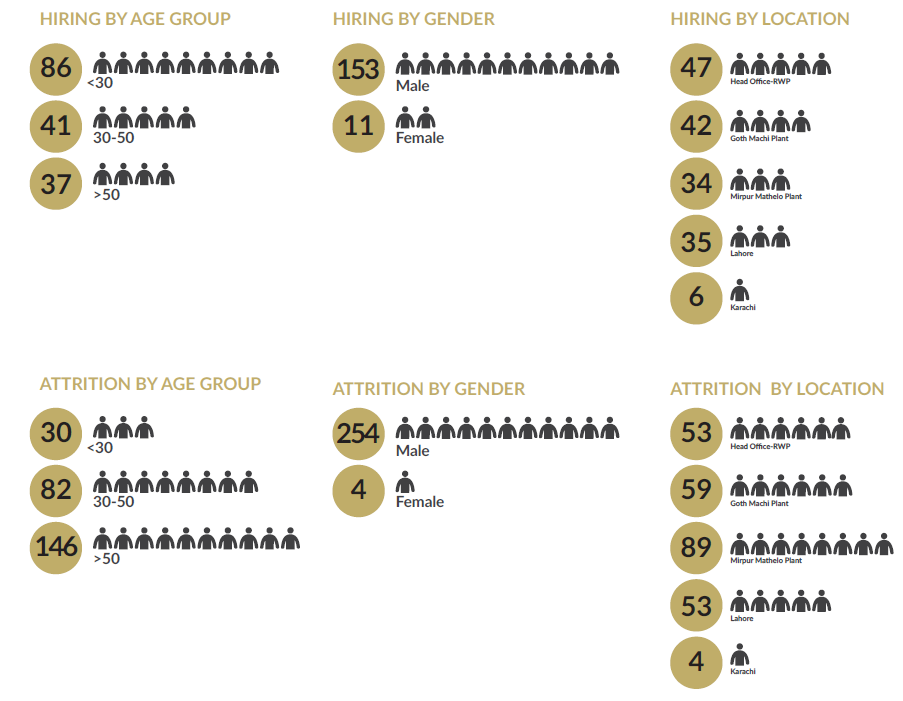
BY INVESTING IN OUR WORKFORCE
We create value through use of our human capital and share the value created with our employees in shape of employees’ salaries and benefits. In 2016, we paid Rs. 7,609 million as workforce salaries and benefits, which makes our workforce an important investment and valuable asset. We pay wages and salaries that are determined by local relevant competitive markets rather than by legally defined minimum wages. However, we exceed the minimum wage threshold at all of our operational sites. During the year, the ratio of standard entry level wage to local minimum wage was 1.27:1 across all significant locations of operations.
Salaries and benefits
FFC does not discriminate basic salary or remuneration on the basis of gender. No intentional differentiation is made in benefits provided by FFC according to the type of employment contract. Only female employees are given maternity leave. A total of 82 female employees were eligible for parental leave, out of which six female employees availed maternity leave in 2016. The return to work and retention rate of employees after availing parental leave was 100%. Moreover, the employees who took parental leave and returned to work remained employed for more than 12 months after their return to work.
We reward employees on the basis of performance and their role in the advancement of company objectives. The ratio of basic salary and remuneration is one to one at FFC. All FFC employees received performance appraisal in 2016. We regularly monitor benefit plan obligations for relevance, compliance, costs and stability to ensure that the benefits are in line with the operating environment.
We maintain separate funded pension and gratuity schemes where all obligations of funds are financed by FFC. Our all eligible employees who complete the qualifying period of service and age are benefited by these schemes. The trustees administer these funds. The annual contribution to gratuity and management staff pension funds are based on actuarial valuation. The defined contributory provident fund is for all eligible employees for which FFC contributions are charged at the rate of 10% of basic salary. The employees also contribute 10% of basic salary to provident fund. The provident fund may be reimbursed after an employee leaves the organization or may be transferred, as per the convenience of an employee. We spent an amount of Rs. 766 million on defined benefit plan obligations in 2016. The benefits are provided to full time employees including management and staff. These benefits are not offered to contractual employees.
BY DEVELOPING SKILLS AND TALENT
We provide training to employees at all levels within the organization to nurse their talent and knowledge base. We believe that motivating and training our employees will contribute significantly to their skillset and success of our company. We consider it important that employees have the opportunity to realize their potential and develop a successful career. Based on this thinking and principle of equal treatment and equal rights, we offer our employees internally and externally conducted specialist and interdisciplinary training and qualification measures.

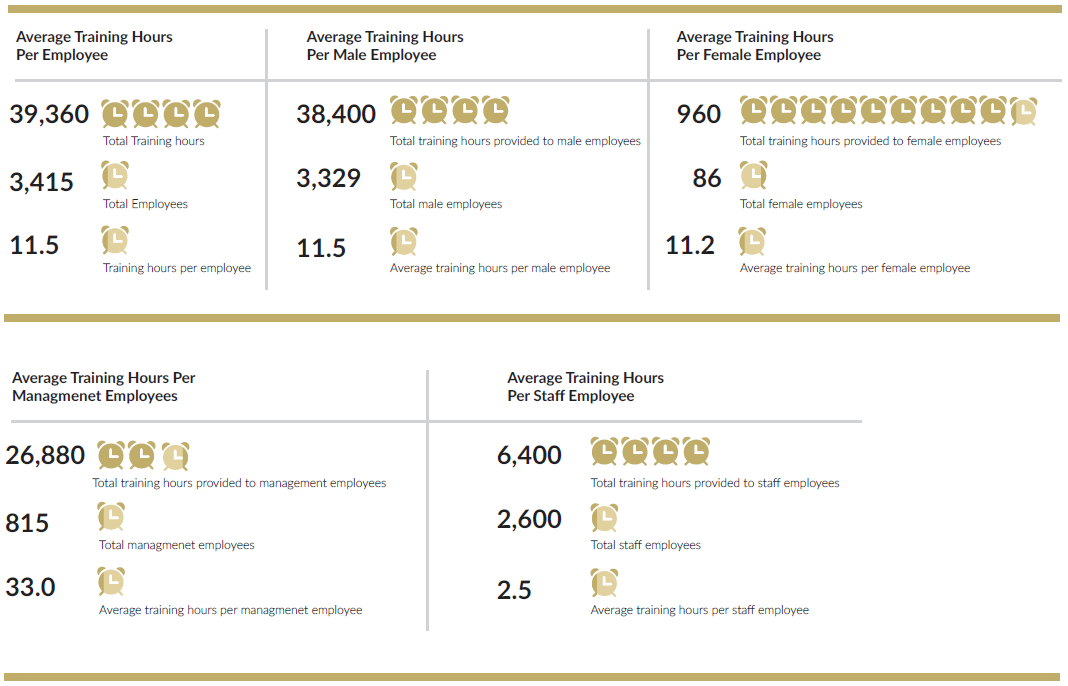
At FFC, HR development framework focuses on training and education of employees, which consists of a three-step-process, first assessing employees’ competencies, training them for their job, and then encouraging the development of employees through education. This helps to identify skill gaps within the organization and looks to addresses those gaps; ensuring the right people are in the right jobs for ensuring long term sustainability of the company.
We provide our employees career development opportunities, which goes beyond training. We have formal talent management programs which help us map employees’ skills and match them to new opportunities. This also supports effective succession planning, particularly for senior and other strategic positions within the company. The employees enhance their skill set and get lifelong learning through a management skill development program throughout the career, provision of long term leave for improving professional qualifications, offshore technical services and deputation to diversified businesses.
BY PROVIDING A DECENT, PRODUCTIVE PLACE TO WORK
We do our best to provide a decent and productive workplace to our workforce. Regular health and only on their suitability for the open positions and their individual potential for a successful future at FFC – in line with the corporate strategy and objectives. However, as a common practice, while hiring junior level staff/apprentices at plants, relaxation is given to the local population to encourage the locals. Likewise, in the marketing group, preference to post locals, from among the selected ones is also given due consideration to resolve communication issues/language problems. No senior management employee at locations of significant operation is hired on the basis of location or domicile. No specific quotas for women, specific nationalities, ethnic minorities or special age groups exists for senior management, Board and Executive Committee. All the candidates are evaluated and selected on the basis of the same list of criteria. However, to promote economic independence of people with disabilities, FFC extends employment opportunities to such persons along with special health care and ancillary facilities. During the year 54 people with disabilities were employed by the Company.
BY INVESTING IN HEALTH & SAFETY OF WORKFORCE
Safety of our people and processes is our top priority. FFC always endeavors to educate employees on health and safety topics to ensure maximum level of health and safety of its labor force. The protection goals as well as health and safety aspects are monitored and reviewed on an ongoing basis. The operational aspect of health and safety practices in manufacturing units are governed by the GM (M&O) of the manufacturing units. HR head at plant site is responsible for fair labor practices, policies with respect to regulations and laws as well as the other activities for the benefit of the employees. FFC has a system in place for risk assessment of operations and committed to preserve its employees’ health by avoiding accidents as much as possible. We have long standing safety culture at plant sites along with a detailed reporting of process and plant safety. We carefully track incidents, complaints received from stakeholders and take prompt action for resolution in justified cases. During the year, no complaints relating to labor practices were filed.

Continuous efforts to prevent accidents at work are an essential part of our production activities and require constant motivation of employees by line managers. As a result of the high commitment to health and safety the incidents concerning health and safety issues have decreased over the years and our plants are producing record of safe man hours over the years. 14.81 million Man-hours of safe operations for employees and 23.53 million Man-hours of safe operations for contractor employees were also achieved as of December 31, 2016 at our plants only through employees’ commitment and safety first strategy.
Urea manufacturing is a clean, safe and close process. Workers only come in contact with the finished product ready for shipment and there is no major risk of occupational diseases nor did any such known disease occur related to the process. However, the regular technical controls and measurements are carried out at workplace to ensure safe working conditions and regular health checks are conducted for production employees. FFC offers discounted health programs and attaches great importance to protecting employees from workplace accidents. Line managers are responsible for training employees in safety and identify the extent to which employees are familiar with the safety procedures at processes.
Regular trainings are conducted on various safety topics including safety culture reinforcement training for management & staff, emergency response & rescue handling, general safety trainings for contracted out employees, contractor supervisor trainings, safety culture reinforcement trainings (contractor employees), safety orientation for interns and apprentices, safety orientation for plant visitors & guests, Behavior based safety training, training on job safety analysis, hazard identification risk assessment and determining control (HIRADC), noise induced hearing loss awareness, energy management, environment protection & pollution prevention, disaster response training and excavation safety. The implementation of such trainings is also a clear signal to improve workplace safety. Not only do employees learn how to behave more safely and prevent accidents through targeted training courses, but – by also involving managers in the process – a strong emphasis is placed.
A Worker’s Council Committee under the Industrial Relation Act exists in which worker’s representation is 50%. The functions of the committee include promotion of security of employment for workers, monitoring health & safety conditions and job satisfaction levels. Meetings of the Worker’s Council Committee are organized as per Law. Moreover, a Health & Hygiene Committee also exists and the committee visits the areas periodically to improve the standards. As per industrial act, this council operates at the facility level. To promote health and safety at plant site, in addition to minimum legal requirement, the company has in place different forums and committees to discuss and take action on health and safety issues. All the workers get representation in these committees through their supervisors and line managers.
The company accounts first aid injury in the injury rate and the lost days means schedule work days, lost day count begins the day after the incident. The formal agreements with CBA covers health and safety related provisions. The extent of coverage of health and safety topics in the agreements is almost 80%. Moreover, all the employees of the company come under the umbrella of an extensive medical policy which has been formulated in the light of the health and safety requirements of The Factories Act, 1934.
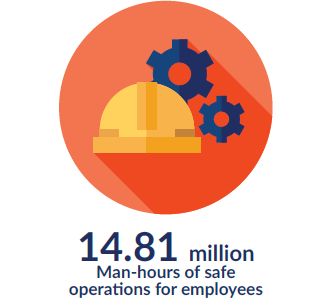
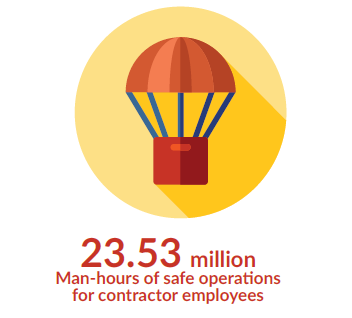
Trusted Business Partner
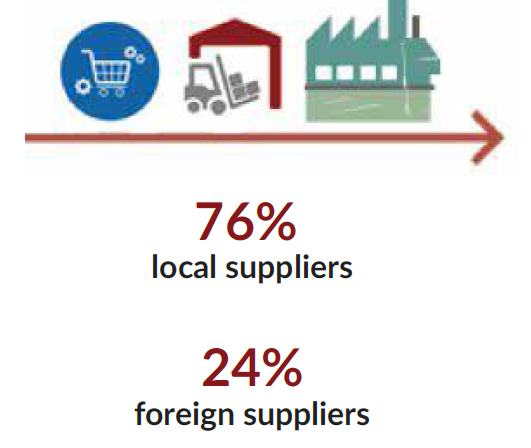
BY PROCURING LOCALLY
Suppliers are strategic allies who support our success and ensure consistent provision of products to our customers. We believe that the collaboration makes the difference. Our supplier relationships go beyond the purely commercial sphere and include a mutual understanding of what it takes to promote good practices and pursue responsible and sustainable development. The procurement function at head office and plant sites is responsible for management of procurement practices in line with Company policies. The procurement policies are evaluated regularly and updates are carried out, if required.
We procure most of our requirements from the locations in which our respective operating facilities are located as far as qualitatively compatible, technically feasible, and economically justifiable. This way, FFC’s activities support the economic development of the areas concerned. FFC is not particularly dependent on any of its suppliers except the supplier for natural gas which is basic raw material for fertilizer manufacturing. Our suppliers consist of local suppliers and foreign suppliers. The major raw material and other components which can be easily purchased from Pakistan are procured locally while the materials and components which are not available in Pakistan are purchased from abroad. Our 76% purchases are from local suppliers and 24% from foreign suppliers. To improve our supply chain management and facilitate our suppliers, we launched eProcurement System in 2016. The suppliers and contractors can register as part of our supply chain with respect to goods and services, can gain information on opportunities and submit bids in addition to having access to other useful information.
BY WORKING ON SUSTAINABILITY IN SUPPLY CHAIN
We are well aware that today’s complex business environment and management of impacts beyond organizational boundaries require leading supply chain management methods. Incorporation of sustainability criteria in selection, working with suppliers to upgrade working conditions helps to limit exposure to unexpected events, negative environmental and social impacts and supply disruption, while building long-term core competence and effective management of supply chain.
We have a sustainability criteria to select and manage our suppliers, outsourcing partners, and service providers. This selection criteria takes into account conditions relating to sustainability factors such as, environmental management, working conditions, respect for human rights, complaint management, safety standards, and financial creditworthiness. The upgrading of the criteria is under consideration to include more comprehensive criteria by including other factors relating to labor management practices, human rights and society related practices. We plan to educate our supply chain partners by sharing the criteria through inclusion of the relevant suppliers in FFC’s supplier assessment process. In order to monitor how suppliers deploy FFC’s sustainability criteria, FFC will require the major suppliers to produce third party verification with respect to FFC’s sustainability criteria and may also carry out on-site audits in the future, if deemed necessary. This supplier sustainability criteria will strengthen the efforts and will provide a reference framework for social and environmental protection in supply chain. As part of its supplier relationship management and to strengthen its vision and approach of sustainable supply chain, FFC regularly hosts trainings for its haulage contractors as well as dealers. Apart from creating awareness, these activities help FFC to engage with its supply chain for the deployment and realization of different activities. We are focused to work with suppliers and partners to improve the entire supply chain from a sustainability perspective.
The ultimate governance of strategy in relation to supplier management lies at the highest level of the management. The respective departments deal with suppliers in line with the supplier management strategy of FFC. FFC evaluates the effectiveness of its management approach through feedback from various stakeholders and surveys conducted.
Our investment agreements include human rights clauses and undergo human rights screening. All major investments must be approved by the Board of Directors. The Board Committees recommend the investments proposal after detailed working and review which is based on financial, strategic and sustainability criteria, the last of which also include human rights aspects. Moreover, the regular procurement also takes into account the sustainability criteria to screen the new suppliers. 282 suppliers, who applied and registered during the year, were screened against existing sustainability criteria during the year.
FFC is not aware of any negative environmental impacts of supplier’s operations during the year. FFC is committed to positive social impacts through its labor practices, respect for human rights, societal interventions, responsible marketing, and encourages its supply chain partners to engage in such activities. The company is not aware of any negative social impacts of its suppliers’ activities during the year.
BY SUPPORTING LOCAL COMMUNITIES
Sustainable Development Goals adopted by nations in 2015 at Copenhagen and the national priorities are the guiding principles for our value creation and sharing with our local communities. Our work in local communities contributes to the Sustainable Development Goals of No Poverty, Zero Hunger, Good Health and Well-being and Quality Education. We support communities through taxes, local procurement, donations, and provision of facilities around plant site. In 2016, we spent Rs. 122 million on CSR activities. Most of the spending was in the areas of education, health care, community support and uplift, relief and rehabilitation and event sponsorships. Through our sports sponsorships, we encourage healthier lifestyles and grassroot participation in sports activities.
The implementation and monitoring of social activities at all the locations are routed through Sr. Manager (CSR) who also reviews and analyzes the monthly progress of social initiatives. We use various tools to monitor and follow-up performance and commitments to society. These include independent monitors as well as in house reviews. Progress is reported to the senior management on a continuous basis. From this year, in order to effectively manage our CSR activities, Sona Welfare Foundation (SWF), a fully dedicated entity, was established for carrying out interventions in the fields of healthcare, education, sports and rural development.
Our sustainability efforts are committed to the common good at locations of our operations. Acting responsibly in all our activities, we are playing an active role towards sustainable development in areas of operations and support local economic development. The major indirect impacts are enhancing skills and knowledge, jobs in supply chain, new businesses resulting in economic development of the area. We are raising living standards of population in areas of operations, both directly and indirectly, by creating added value. Our approach is driven by the needs of targeted community, carried out through surveys, focal groups and meeting with the local community. Based on these guidelines, the interventions are devised to deliver maximum benefit & impact. We regularly engage with local communities to identify any negative effect of our operations on local communities and as result of these engagements, we identified that there were no significant negative effects on local communities during the year.
Keeping tradition of supporting local communities
Year => Donation in millions Rs.
2016 => 122
2015 => 168
2014 => 188
HEALTHCARE
Good health is an important factor for society’s contribution towards economic development of the country. In line with SDG 3, “Good Health and Well-being” are national priorities, we placed major emphasis on provision of health care facilities not only at our plants, adjacent localities but also nationally in collaboration with different entities. During the year, we contributed Rs. 8 million to Hazrat Bilal Trust Hospital at our Goth Machhi plant and also deputed a female doctor for taking care of female patients. We contributed Rs. 16 million to Sona Welfare Hospital at our Mirpur Mathelo plant which helped in provision of good healthcare facilities and treatment to 35,000 patients of the surrounding community. We donated ambulance and Rs. 2.85 million to various hospitals for construction/upgrading and purchase of medical equipment.
EDUCATION
Education is the most important investment for sustainable economic development. Our interventions in the field of education contribute to SDG 4 “Quality Education” and help surrounding communities’ uplift and socio economic development. FFC contributed Rs. 8.1 million under its adopted schools program which included 20 annual scholarships, distribution of books and stationery besides improvement in infrastructure and payment of salaries of government schools. We provided financial support of Rs. 3.1 million and reconstructed flood affected school at Tanda Ghambir.
Realizing the importance of education of children with disabilities, we donated Rs. 2.39 million to Special Education Academy for provision of education and support equipment. We provided Rs. 19 million in shape of financial support to Sona Public School, and provided 67 new scholarships under the ward of farmer scholarships and increasing total scholarships to 164. FFC sponsored 250 students for Microsoft Office championship. Moreover, FFC provided scholarship of Rs. 5 million to 7 students over a period of four years to complete education at FC College Lahore.
SPORTS
Sports promote healthy minds and productive societies. Keeping its tradition of promoting healthy sports activities, we made donations for various sports activities and sponsored sports events. Some of the notable events where we donated or sponsored were Asian Kabaddi Championship, Sona Cup Kabaddi, Sona Hockey Tournament, Sona Volley Ball, Sona Golf Tournament, Sona Long Tennis Tournament, Sona Girls Volley Ball Tournament, Nishan -e- Haider Kabbadi, Taekwondo Championship, Tour de Pakistan Cycle Race, IC Columbus Cup Delhi and Deaf Cricket Championship 2016.
RURAL DEVELOPMENT PROGRAMS
Our rural development programs are focused to solve the severe problems faced by communities, create opportunities to overcome poverty and make contributions towards the economic development of our country. Responding to the clean drinking water problem faced by the community, we installed water pumping stations, transformers and laid underground pipeline at Jhimpir.
NATIONAL CAUSE DONATIONS
FFC sponsored the Swat Festival to encourage tourism and build the country’s soft image. We donated Rs. 5 million to the Pakistan Armed Services Board for completion of projects to facilitate ex-servicemen. The Company collaborated with Pakistan Poverty Alleviation Fund and National Rural Support Program to extend support to cotton farmers in shape of loans. During the year, loan to 300 cotton farmers were provided.
We partnered with WWF in 2015 for a two year program for conservation of Indus River blind dolphin and contributed Rs. 2 million for the program. The Project has successfully concluded its time line and worked effectively for the conservation of Indus River Dolphin and educating communities at large.
BY CONTRIBUTING TO NATIONAL EXCHEQUER
We recognize that we have a role to play in supporting public services through our tax payments and value addition in terms of foreign exchange savings. Besides corporate income tax, we pay taxes as an employer and sales tax on our products. We also act as a tax collector – through tax deduction on employees’ salaries, payments to suppliers and contractors. Our approach comprises of two principles. Firstly, we actively manage our compliance by working within the rules set by government. Secondly, we work on tax optimization. Once our business decisions are finalized, we work on optimization of our taxes. We take decisions for business reasons and not for tax advantages. However, we do take into consideration the tax incidence in decision making to avoid any disadvantage to our shareholders.
During the year, cash contribution to national exchequer comprising of taxes, levies and accrued GIDC was Rs. 45 billion, being lower than previous year due to lower profitability. Value addition in terms of foreign exchange savings was US$474 million through import substitution of 2,428 thousand tonnes urea sold during the year.
-
We are aware of our ethical responsibility for environment friendly and fair business transactions. Our employees are educated and trained to take responsibility in line with their function, authority and qualifications to augment our corporate responsibility of ethical business. The Rio Declaration requires that countries take a precautionary approach, according to their capabilities, in order to protect the environment. Measures to prevent environmental degradation must not be postponed where there are threats of serious or irreversible environmental damage. Nevertheless, such measures should not pose an excessive financial burden as Principle 15 of the declaration combines environmental protection with a cost-benefit analysis. In order to protect the environment, we apply the precautionary approach. We have a CSR policy in place with clearly defined objectives. The CSR policy states the importance of inclusive growth as one of the key areas for sustainable development.
-
FFC is committed to protect nature and environment through continued investments in environment friendly technologies and production processes. In addition to the sustainable management approach, the scarce resources are also leading to intensive materials management to ensure that resources are handled as cautiously as possible. We efficiently program our production processes to ensure a continuous improvement in energy and water efficiency and lower levels of (pollutant) emissions and waste. The biodegradable packing material for Urea along with renewable resource utilization, where applicable, helps us to move forward towards establishment of a widely sustainable value chain.
FFC is continuously improving its processes and production procedures on an ongoing basis in line with its environment management approach which has helped to reduce the absolute as well as relative volume of used resources, waste, waste water and air emissions. FFC has an integrated Environmental, Health & Safety policy which is applicable to all manufacturing plants for maintaining high standards of Health, Safety and Environment (HSE). The objective is to preserve the environment from degradation and provide a safe and healthy workplace, while improving the quality of life of employees, contractors, visitors and plant site community.
The GM (M&O) at each plant is responsible for performance, regulatory affairs and monitors the compliance across the manufacturing plants for Health, Safety and Environment (HSE). FFC regularly conducts trainings for senior management of manufacturing units as well as employees working on line functions. FFC has specifically designed training modules for different internal trainings and employees are nominated for external trainings as well. HSE systems are regularly monitored for ensuring compliance with internal HSE policies and applicable laws and regulations. The manufacturing plants are certified for ISO 9001:2008 Quality Management System, ISO 140001:2004 Environmental Management System and OHSAS 18001:2007 Occupational Health & Safety Assessment Series (OH&S Management System). These management systems enable us to identify the risks and potential opportunities, improved internal data management, building the confidence of stakeholders and identify energy management spots. The SOC & EMR forums at facility level perform an internal check to find out the gaps on a regular basis.
As a result of these efforts and stringent voluntary commitments, FFC was not aware of any cases in the year under review in which it has been accused of not having acted essentially in compliance with laws, regulations and voluntary codes of practice in connection with nature and environmental protection. As such, FFC did not have to pay any fines or non-monetary penalties for non-compliance with environmental laws and regulations in 2016. FFC has environmental grievances mechanism in place where complaints regarding negative environmental impacts of operations can be filed. The resident manager at plant site deals with such complaints and necessary actions are taken as per need. During the year, no complaint was filed.
FFC has identified that climate change may have impacts on its business in shape of physical as well as financial nature. The changing weather patterns may affect the product consumption patterns and farm productivity resulting in reduced purchasing power of end consumers. FFC is aware of this important issue and has set priorities by making sustainability an integral part of its corporate strategy, regardless of economic or seasonal fluctuations and exceptions. FFC is focused to reduce the environmental load of its operations to further decrease any possible impact in the future. However, the expected financial impact of climate change related risks on company operations is not monetized as the risks are not substantial at the moment and no systems were available. The company is planning to develop a system to calculate the financial implications of climate change related risks and opportunities on its operations.
FFC regularly makes investments for environmental protection and management. The investments and expenses incurred on environmental protection and mitigation of the impacts are recorded at respective units. The figures are consolidated at the end of each year under two broader heads i.e. prevention and management costs. The investments in the area are made as cost-effectively as possible. It is an integral part of general investment planning and subject neither to a cost-benefit analysis nor a specific return on investment period. The environmental investment totaled about Rs. 89.96 million in 2016, of which 94.46% was spent on environmental protection, approximately 4.25% on monitoring and 0.29% on certification and trainings.
-
Respecting internationally proclaimed human rights are fundamental to our corporate values and we put great emphasis on upholding human rights. We support and abide International Charters on Human Rights in our sphere of influence. We have in place a number of internal policies to safeguard basic human rights as defined in the legislation and International Charters.
Some of the policies in relation to human rights management are nondiscrimination policy, forced and compulsory labor policy, child labor policy and anti-sexual harassment policy. Once again, we are not aware of any activity, work related incidents or business transactions in this reporting year concerning the violation of human rights. The code of conduct for employees provides basic guidance on human rights, non-discrimination and freedom of association. A varied workforce is of great value to us, consequently, we do not tolerate any discrimination based on the race, ethnicity, sex, religion, views, disability, age or sexual identity of employees. During the year we have carried out training on anti-sexual harassment policy. Sixty employees participated in the training. No training of security personnel on human rights policies or procedures was carried out. However, we have chalked out a comprehensive plan for training our security personnel on human rights policies and a specific goal has been included in this year’s report. No complaint was received for discrimination during the reporting period.
FFC has a notification and reporting system in place for taking action on complaints with respect to human rights violations. The most senior officer responsible for managing human rights issues and implementation of various policies related to human rights is the General Manager (GM) HR. FFC adopts a culture of trust and feedback. Complaints are received via line managers or works councils within the relevant statutory framework. Beyond this, if the aforementioned procedure does not achieve the desired outcome, complaints can also be made through HR department. The legal department reviews the complaints filed for amicable solution and possible legal impacts. In 2016, no complaints were received. Keeping in view, the level of compliance, we have not carried out any evaluation of our approach of managing and respecting human rights.
All significant investment agreements have been scanned for human rights issue while performing due diligence for that specific agreement. FFC is a member of UNGC and strictly adheres to the human rights charter and applicable laws. However, the screening of new suppliers was not carried out against human rights criteria. FFC is in process of developing a criteria, keeping in view the local conditions, for screening of suppliers on social impacts. FFC carries out regular review of the operations for human right impacts and in the year 2016, FFC carried out a review of 100% of operations for human rights impact assessments. We have not carried out any screening of significant suppliers, contractors and other business partners during the year.
FFC respects the freedom of association right of entitled employees. FFC knows of no cases in which freedom of association or the right to collective bargaining have been seriously endangered or even breached – not even by suppliers. We reject any form of child labor and strictly comply with local regulations concerning legal minimum age requirements for work permits. We are not aware of cases of child labor in the company or with our suppliers. Similarly, we reject any form of forced labor or slavery. Nor are we aware of any cases of forced labor or slavery in the company. We are aware of the fact that the non-compliance with minimum human rights regulations by the supply chain partners may have material impacts and we support and encourage our supply chain partners to obey the human rights laws and adopt best available practices in this area.
-
Sustainable returns to our shareholders and providers of capital is one of the primary functions of our business and supports our sustainability initiatives. We have well defined goals, objectives, policies, procedures, and resources supported by state of the art business management systems for operational management and delivering exceptional results. The boundary for the financial impacts is within the Company and FFC is directly responsible for economic impacts as a result of its financial performance. The Chief Executive and Managing Director (CE & MD) is responsible for operational management and economic performance of the Company, The Board of Directors has delegated the day to day management to the CE & MD. The Board of Directors reviews the performance quarterly and evaluates the management approach for economic management against set targets. The changes, if required, are decided by the Board and implemented by the CE & MD. The results of the evaluation are shared through the review of the Chairman, the CE & MD, and the CFO in Annual Report. The detailed information can be found at page 48-58 of the 2016 Annual Report.
Despite slow global recovery, the overall economic indicators for Pakistan were positive this year. However, this year was another challenging year for us coupled with pricing pressure from Government and delayed implementation of fertilizer subsidy which resulted in net profit of Rs. 11.78 billion, 30% below compared to last year, Net revenue for the year was Rs. 72.88 billion with 14% decrease, while cost of sales also decreased by 2% on account of less repair and maintenance and absorption of overheads by higher production. The net impact was decrease in profitability as a result of increase in distribution and finance costs and imposition of super tax. The contribution to National Exchequer also dropped this year by 25% due to lower profitability. We paid dividends of Rs. 10,903 million in the year 2016. Total earning per share for 2016 was 29.74% lower compared to the previous year, which is in line with the decreased profitabili ty. Keeping in view, the consistent decline in net profit over the years due to increased raw material prices, the company is taking measures to reduce the costs and diversify its business to ensure sustained returns to our investors.
-
The value added through the activities of FFC and distributed to its various stakeholders in 2016 totaled Rs. 85,951 million.
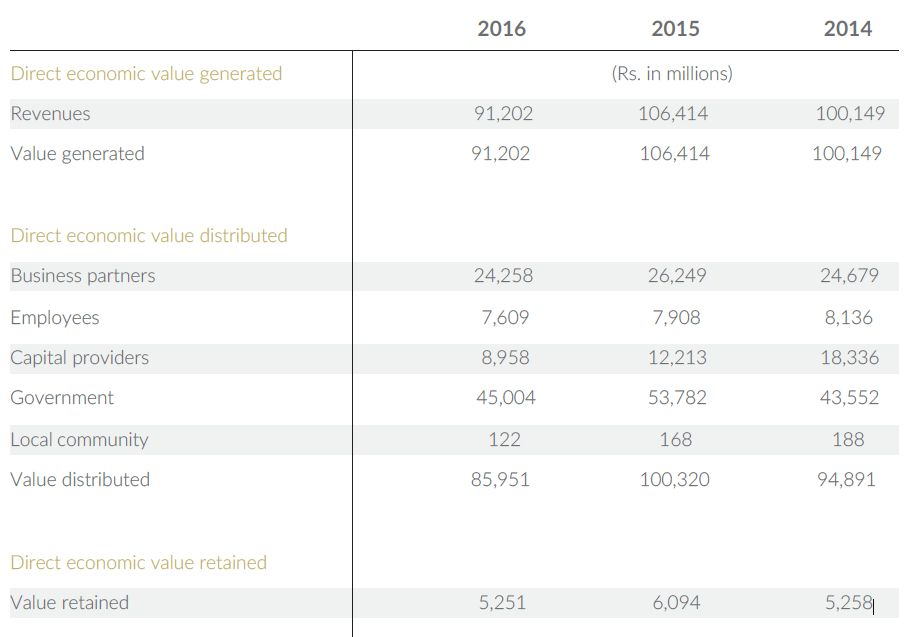
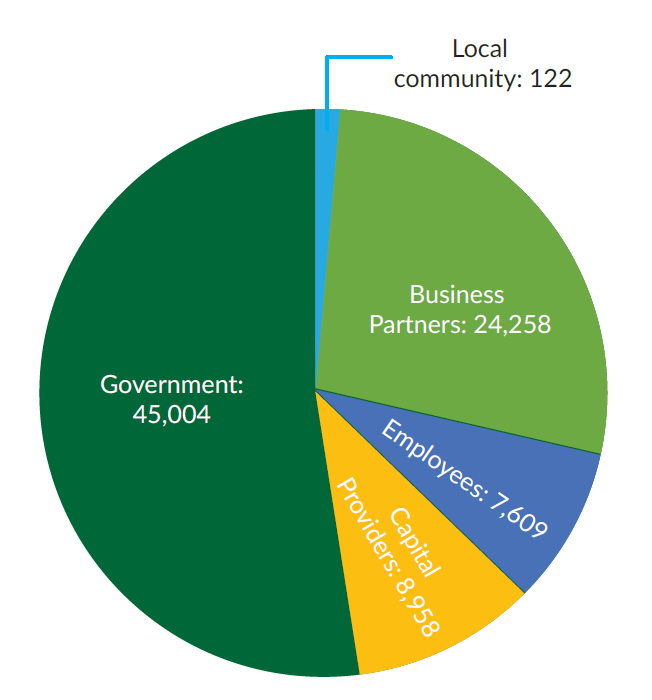 Direct economic value distribution for the year 2016
Direct economic value distribution for the year 2016Sustainable value creation means sustainable operations independent of any subsidy or other public funding. In 2016, FFC did not receive any direct or indirect financial assistance from the government.
-
Stakeholders’ input is vital for effective sustainability management and creating shared value. Their feedback and input help to improve our products and decision-making process. Our stakeholders include shareholders, customers, local community, regulator and our business partners. Our engagement with stakeholders varies depending upon the stakeholder groups and its relation with FFC and includes, face-to-face, group discussions, meetings, surveys and seminars.
Our engagement helps identify possible risks and new opportunities in areas like product quality, pricing, Agri. Services and, more broadly, in terms of our reputation as a responsible manufacturer and marketer of fertilizer products. More details on our involvement with stakeholders are available on Page 15-16 of this report.
-
Smooth functioning of economic systems and availability of equal opportunities are crucial for social balance in the society. Corruption leads to distortions in the economic systems and creates social unbalance in the society. The impacts occur at FFC and our suppliers through our business relationship. We have a strict policy of zero corruption in its operations. We are strict on combating corruption in all of our business areas including our dealings with the suppliers. We have a strict code of conduct containing organizational policy on corruption and effective risk management system for identification of corruption risks. We investigate corruption risks through ongoing internal auditing activity.
We carried out risk assessment for corruption risk covering all of our operations and there were no incidents of corruption identified and reported during the year. We have not conducted any specific training on anticorruption policies and procedures during the year.
We have an official slogan “Say no to corruption” in all our official correspondence reinforcing our commitment towards zero tolerance to corruption. FFC was not aware of any cases in the year under review in which FFC was accused of not having acted essentially in compliance with laws, regulations and voluntary codes of practice in the economic or social areas. Consequently, no corresponding fines or non-monetary penalties for failure to comply with legal regulations are known either. FFC attaches particular importance to fair interaction with competitors, suppliers and customers.
In 2016, FFC did not have to pay significant fines or suffer non-monetary penalties for failure to comply with legal regulations. FFC has developed formal procedure for dealing with such complaints at each location of operation, where interest groups may contact the resident managers of the relevant location at any time to lodge complaints, if any. Bodies also exist to deal with specific issues, e.g. works councils, which address workforce concerns. In the year in question, FFC was not aware of any complaints by interest groups or institutions at the relevant locations regarding issues of public or social concern.
-
Complying with applicable laws and respecting and honoring commitments is corner stone of corporate governance. We adhere to laws, regulations and code of corporate governance as applicable in Pakistan. In addition to adherence to laws, our own system of governance, we have international commitments in shape of memberships and compliance with International Charters. We are member of UN Global Compact which is a strategic initiative for companies that voluntarily commit to ensure that their business activities and strategies are in line with ten universally recognized principles relating to human rights, labor standards, environmental protection and fight against corruption. Being a signatory, we have underscored our comprehensive commitment to sustainable development and responsible corporate governance. FFC commits that, within its sphere of influence, it will work for protection of human rights, create working conditions which at minimum meet the legal requirements, protect the environment and combat corruption. The membership enables the company to share information and ideas with other stakeholders on sustainability efforts.
We are also member of Business for Peace (B4P) group of UNGC. The vision behind B4P is to build a sustained network among participating members to carry their CSR interventions into high risk areas and work in collaboration to build peace across the Globe. We also support the recently introduced Sustainable Development Goals which will stimulate businesses to actively contribute to the sustainable development and help governments to meet National Level Goals leading to Global Goals.
BY RESPONSIBLY MARKETING PRODUCTS
We market our products through our distribution channel to make it as easy and convenient as possible for our customers to buy our products. We have in place basic standards for marketing our products to ensure that our products meet the expectations what we’ve led our customers to expect from us. FFC constantly monitors and carries out regular reviews of all business aspects and processes in order to ensure that they continue to conform to our commitment to sustainability. We aim to produce only quality products that correspond to the International Standards and are accompanied by the required labeling information. The product marketing responsibility lies with the marketing department and the Chief Executive & Managing Director (CE & MD) is responsible for the impacts and marketing of products.
We are aware of the fact that innovation, customer focus, customer facilitation and provision of genuine products are extremely important to meet and exceed the customer demands. Last year, we initiated SMS service to give information about pricing and shipments and revolutionized order placement and payment processes by introducing an electronic payment mechanism in collaboration with associated company Askari Bank Limited through ASKSONA Card. We also introduced security labels (Pehchan Sticker) and special colored stitching thread, which is changed after a specific time to control dumping, malpractices and pilferage of product.
The Provincial Fertilizer Control Order requires printing of information about net weight of the bag, chemical name of the fertilizer inside the bag, chemical composition of the fertilizer, manufacturer and marketer and price. We have dedicated staff trained on labeling as per applicable laws and regulations. During the year, all products were in compliance with labeling requirements specified by the laws and regulations.
FFC adheres to laws, standards and voluntary codes related to advertising, promotion and sponsorship. The voluntary codes include but are not limited to fair competition, ethics, social norms, cultural values and honest disclosure of benefits/features of the product. The company reviews its compliance with the laws, standards and voluntary codes on a regular basis which are dependent on the nature of the activity. There were no incidents – neither offenses nor criminal investigations – on account of breaches against applicable law and voluntary codes of practice in relation to information about the labeling of products and services. Similarly, FFC is not aware of any incidents in which there have been infringements of laws/regulations in terms of the procurement, use or supply of products and services.

